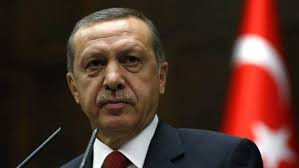 Turkey’s central bank took action Monday to free up cash for banks as the country grapples with a currency crisis sparked by concerns over President Recep Tayyip Erdogan’s economic policies and a trade and diplomatic dispute with the US.
Turkey’s central bank took action Monday to free up cash for banks as the country grapples with a currency crisis sparked by concerns over President Recep Tayyip Erdogan’s economic policies and a trade and diplomatic dispute with the US.
The Turkish lira has nosedived over the past week and tumbled another seven percent on Monday as the central bank’s measures failed to restore investor confidence.
The uncertainty pushed down world stock markets and briefly caused a sharp drop in the currencies of other emerging economies, like South Africa and India, amid concerns that the financial trouble could spread.
The lira hit a record low of 7.23 per dollar late Sunday after Erdogan remained defiant in his economic policies and the standoff against the United States, a NATO ally.
“Turkey is faced with an economic siege,” Erdogan said Monday, in the latest of a series of speeches. “We are taking the necessary steps against these attacks and will continue to do so.”
Addressing a dispute between Washington and Ankara over the detention of a US pastor in Turkey and US President Donald Trump’s threat last week to double tariffs on steel and aluminium, Erdogan blasted the US. “We are together in NATO and then you seek to stab your strategic partner in the back. Can such a thing be accepted?” said Erdogan.
He has threatened to seek new alliances – a veiled hint at closer ties with Russia – and warned of drastic measures if businesses withdraw foreign currency from banks.
Erdogan also ruled out the possibility of higher interest rates, as they can slow economic growth. But independent analysts say higher rates are needed urgently to stabilize the currency and Erdogan’s hard line is one of the reasons investors are worrying.
Erdogan won a second term in office in June under a new system of government that gives him sweeping powers. He has used his new power to put pressure on the central bank to not raise rates.
On Monday, the central bank announced a series of measures to “provide all the liquidity the banks need” – but offered no hint of a rate increase.
The moves are meant to grease the financial system, ease worries about trouble at banks and keep them providing loans to people and businesses.
In times of high uncertainty, banks tend to shy away from lending to each other. A so-called credit crunch, a lack of daily liquidity, can cause a bank to collapse.
Simon Derrick, chief currency strategist at BNY Mellon, said the central bank’s measures are unlikely to be enough. In the absence of a decisive rate increase, he said, “it is…hard to look at these announcements as being anything more than temporary calming measures, rather than solutions to the problems at hand.”
The lira has now dropped some 45 percent this year.
Part of the concerns about Turkey are the same as other emerging markets. As interest rates rise in the US, investors pull their money out of countries that had enjoyed strong economic growth but are perceived as somewhat riskier.
Turkey’s situation is among the most precarious among emerging markets because so much of its growth was fueled with debt in foreign currencies. That makes the currency drop so much more painful as it will increase the cost of servicing debt for Turkish companies and banks and could lead to bankruptcies.
So far, the impact on developed economies has been relatively contained. Stocks have fallen modestly in the US and Europe since last week, but analysts do not see a big risk of financial turmoil. A few European banks have business there that could lead to losses, but that is not expected to pose a systemic danger to the region.
Among the most important things investors are watching out for is whether Turkey, in an effort to stymie the outflow of capital from the country, puts limits on money flows.
Berat Albayrak, Turkey’s finance chief – and Erdogan’s son-in-law – said Sunday that the government had no plans to seize foreign currency deposits or convert deposits to the Turkish lira. He said it had readied an “action plan,” without elaborating.
The country’s economic trouble has been heightened by the diplomatic dispute with the US centred on the continued detention of US pastor, Andrew Brunson, who is on trial for espionage and terror-related charges.
Foreign Minister Mevlut Cavusoglu said Monday that the United States would not achieve aims by exerting pressure and imposing sanctions on Turkey.
Addressing a conference in Ankara gathering Turkish ambassadors, he called on Washington to “remain loyal to ties based on traditional friendship and NATO alliance” with Turkey.
Meanwhile, Turkey moved to take legal action against hundreds of social media accounts it accused of provoking the lira’s plunge.
The Interior Ministry said it initiated legal investigations against 346 social media accounts “which posted content provoking the dollar exchange rate”.
It did not provide information on the accounts but said they aimed to “manipulate the dollar rate and form negative perceptions” concerning the Turkish economy.
The Istanbul Public Prosecutor’s office announced it had begun investigating “those who had taken actions which threatened economic stability”. The Capital Markets Board of Turkey issued a similar warning to those who spread “lies, false or misleading information, news or analysis”.
(FRANCE 24 with AP and AFP)

Leave a Reply
You must be logged in to post a comment.